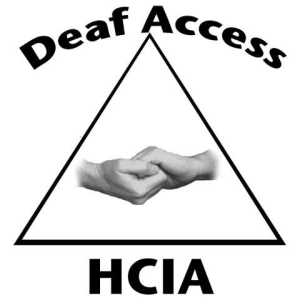
DAC Online Resources
Provide Services as an Interpreter
Deaf Access Committee – Questions and Answers (PDF Download)
“Online Intergroup: Alcoholics Anonymous” – Online Meetings for Deaf and Hard of Hearing Alcoholics
“Sober Fingers” – Videos of ASL Interpretations of AA Speakers
Deaf Access Committee
The Hill Country Intergroup Association – Deaf Access Committee (HCIA-DAC) is a group of AA members who work together to help make AA in the Austin Metro Area accessible to Deaf and hard-of-hearing (HH) alcoholics. We follow the 12 Traditions of AA and are not affiliated with any other organization. Our primary purpose is to support AA groups and members in carrying the message to Deaf and hard-of-hearing alcoholics. Our work is in keeping with the guidelines from the General Service Office (GSO).
What We Do
We help AA groups carry the message to the Deaf alcoholic. We do this by hiring professional sign language interpreters for meetings and paying those interpreters for their service. We hire skilled interpreters who are familiar with AA and committed to anonymity.
We maintain a list of members willing to sponsor Deaf alcoholics. We maintain a list of Deaf members available to speak at or chair meetings. When a Deaf speaker is requested, we will send an interpreter for the meeting. We keep an up-to-date calendar of interpreted meetings and keep the sober Deaf community informed of changes.
How We Do It
We are the liaison between Deaf AA members and AA groups. Donations from AA groups, districts and individual AA members fund HCIA-DAC who pays for interpreters. In keeping with the traditions, HCIA-DAC has no other affiliation and accepts no outside contributions. Our service positions include a chairperson, secretary, treasurer, interpreter coordinator, event coordinator, webmaster and several members at large. We observe rotation of service and hold monthly business meetings that are open to all. We cooperate with AA as a whole and are a standing committee of Hill Country Intergroup Association – Deaf Access Committee.
How to Contribute
For AA Groups and Members:
Deaf and Hard of Hearing AA members need the fellowships’s assistance in order to both receive the message and be able to interact with other AA members and be a part of the group. HCIA-DAC exists in order to foster relationships between the hearing and the Deaf AA members and insure consistency of AA meetings with qualified interpreters. Because the financial burden of this is too much for any one AA member, or for any one home group, we are requesting that every AA group consider designating a portion of their 7th tradition funds toward our spiritual responsibility: When anyone, anywhere, reaches out for help, I want the hand of AA to be there!
Thanks to all who are willing to assist in carrying the message to our deaf AA members, who are reaching out for our help and want to have the same access to the message of hope as other members of our fellowship. Bill W. said, “When we are generous with the hat,we give a token that we are grateful for our blessings and evidence that we are eager to share what we have found with all who still suffer.”
If you would like a member of the HCIA-DAC committee to come speak to your group about the history and purpose of HCIA-DAC, answer questions, or find out how to help us, one of us will be happy to come to your group conscience.
Special Needs 7th Tradition Contributions:
To contribute toward our primary purpose in helping carry the message to our deaf AA members, some groups pass a separate basket designated for this purpose, and some groups set aside a specified amount per month or quarter. After consulting with your home group members, through the group conscience, please send designated amounts to the following address:
Deaf Access Committee
1825 Fortview Rd. ste #104
Austin, TX 78704
Group Name: _________________________________________
Donation: __________________
Individuals may contribute as well. If anyone would like additional information, please contact us at austindeafaccess@gmail.com.
The HCIA Deaf Access Committee exists to help Deaf people who want to get sober or stay sober be able to do that.
The HCIA Deaf Access Committee exists to help Deaf people who want to get sober or stay sober be able to do that. We believe that it is AA’s responsibility to help any alcoholic who suffers from our disease have access to the message. A Deaf person cannot have access to the message without interpreters, and most cannot afford an interpreter on a regular basis. DAC exists to provide both spiritual and financial support, for Deaf people to participate in AA, get a sponsor, and be part of our fellowship on a regular and on-going basis. Because an individual, especially a newly sober individual, cannot carry the financial burden of interpreters, and because a single group also cannot, we believe that the responsibility should be shared by all AA groups, to pool contributions ear-marked for this purpose, as has been done successfully in other parts of the United States.


